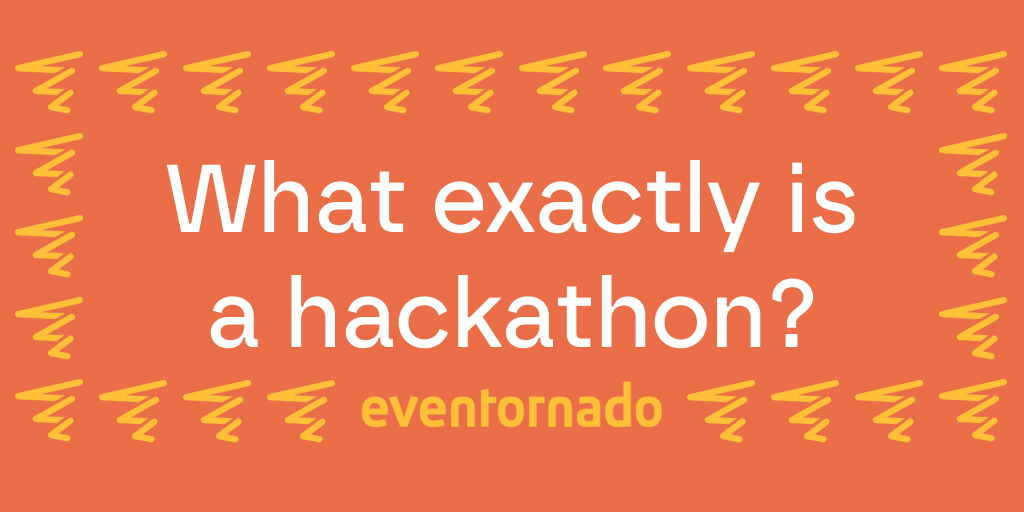
Table of contents
- Introduction
- Hackathon meaning and definition
- Purpose of a hackathon
- Types of hackathons
- Hackathon timeline
- Conclusions
1. Introduction
If you're new to the world of hackathon then this is the perfect blog post for you.
In the next lines, we will explain exactly what a hackathon is and what the word “hackathon” means.
We will provide a simple and clear description of the types of hackathons that are out there, their purpose, and the most classic timeline of a hackathon.
Ready?
Let's understand what the word “hackathon” means
2. Hackathon meaning and definition
A hackathon is a competition where individuals gather into teams, virtually or in person, to solve specific problem statements set by the hackathon organizers in a short time frame, typically 8 to 72 hours.
The term “Hackathon” is a mix of the words “hack” and “marathon”.
People often refer to it also as codefest, hack day, or xxxthon, where “xxx” can be replaced with other words such as:
- datathon: a hackathon on data
- appathon: a hackathon to build apps
- ideathon or creathon: a hackathon to generate creative ideas
- innovathon: a hackathon for innovation
- sustathon: a hackathon about sustainability
- agrithon: a hackathon about agritech
- oceathon: a hackathon about the blue economy and the oceans
- healthathon: a hackathon about health tech
and many more.
While the hackathons were organized originally to speed up software development, nowadays the hackathon approach is applied largely in any industry and sector for many different goals.
Let's explore this matter further in the next lines.
3. Types of hackathons
There are 3 main types of hackathons:
- Physical or in-person: participants will hack in a determined location, usually a university, innovation hub, or corporate premises
- Virtual or online: participants will hack from their preferred location through a laptop and an internet connection
- Hybrid: this format is a mix of the above. Participants can either join in person or from their preferred location
Furthermore, hackathons can be external or internal:
- Internal hackathons are usually hosted by an institution, university, corporation, or company, and only the internal members of such entities are allowed to participate.
- External hackathons can be hosted by any entity, allowing external people to join the event
The final type of hackathon will be a mix of the above.
Therefore, an internal hackathon can be in-person, hybrid, or online.
Usually, external hackathons are not open to everyone in general but they provide a list of targeted groups allowed to participate instead.
Here's an example of a targeted audience message:
“The Hackathon is dedicated to fostering an inclusive and diverse environment, welcoming participants from a wide spectrum of professional backgrounds. This includes, but is not limited to individuals from various sectors of healthcare, such as clinicians, healthcare providers, administrators, and educators; professionals and students in AI, IT, and deep technology; researchers and academicians in biotechnology, health informatics, and epidemiology; as well as experts in health economics, policy, and management.”
Whatever your type of hackathon is, it is highly recommended you rely on a hackathon platform to run it.
In this article, we explained why.
4. Purpose of a hackathon
The main goal of hackathons is to find solutions to problems in a short time.
Hackathons are a powerful tool for hackathon organizers to receive abundant and diverse proposals so they can pick and choose their preferred one(s).
The organizers set the hackathon problem statements that the participants have to address.
The type and field of the problem statements are usually categorized under the hackathon macro topic, which is the specific field, industry, sector, area, or domain of the event.
Here are some examples of hackathon macro topics:
- Bitcoin
- Blockchain
- Blue Economy and Oceans
- Data
- EdTech
- Energy
- Femtech
- Healthcare
- Space
- Sustainability
- Web3
The macro topic of each hackathon is further categorized into different hackathon challenges, each one with its purpose.
Some detailed examples of hackathon challenges and problem statements can be found in this article.
5. Hackathon timeline
The hackathon timeline is the official event schedule, shared with the participants.
It helps the teams to understand how the event will evolve in time and what will be expected from them at every step of the hackathon.
A classic hackathon timeline could be this one:
- ✅ Registrations and team formation start
- ⭕ Registrations close
- 🕵️♀️ Ideation phase start
- ❌ Team formation closes
- 🏁 Hackathon kick-off
- ✍️ Deliverables deadlines
- 👩⚖️ Evaluation
- 🎉Award Event
As you can imagine, the hackathon timeline is different for each hackathon.
It depends on the structure and process of the event.
For example, the period between the "Registrations and team formation start" and the "Registration close" can last just a couple of days to several months.
6. Conclusions
Now that you have a clearer understanding of what a hackathon is, you can explore our website's “events” section and click on each event to get an in-depth overview of real case hackathons hosted on Eventornado.
If you want to know more and understand how we could help you organize your hackathon you can request a demo with our team today!
Related blog posts
Are you looking to run a hackathon on Eventornado?
Request a demo, and we'll have you set-up in no time.
Request a Demo





